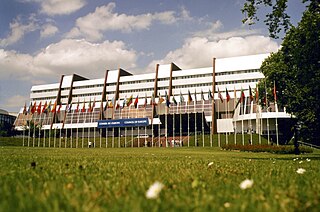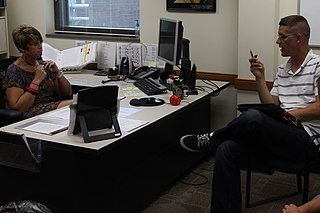The topic of this article may not meet Wikipedia's general notability guideline .(April 2023) |
Co-Counselling International (CCI) is an international peer network of co-counsellors (spelled co-counseling and co-counselors in US English).
The topic of this article may not meet Wikipedia's general notability guideline .(April 2023) |
Co-Counselling International (CCI) is an international peer network of co-counsellors (spelled co-counseling and co-counselors in US English).
Co-Counselling International (CCI) was started in 1974 as breakaway from Re-evaluation Counseling by John Heron who was at the time director of the Human Potential Research Project, University of Surrey UK, and Tom and Dency Sargent from Hartford (Conn., USA). [1] (First published by Human Potential Research Project, University of Surrey, Guildford in 1974) The CCI break was ideological and CCI developed in significantly different ways in practice, theory and organisation.
The first gatherings of CCI co-counsellors took place in 1974 in the USA and in Europe and annual international gatherings have taken place in both locations since then. The European gatherings currently rotate between Germany, Hungary, Ireland, The Netherlands and UK.
John Heron's status within the network has always been as an equal member, although inevitably as a founder member, activist for some 15 years and the person who developed much of the thinking behind CCI there was a certain amount of transference on to him. He now lives in New Zealand and has an involvement with the CCI network there. [2]
There is no imperative in CCI to evangelise and so the network has spread somewhat slowly and haphazardly. In the USA the network existed for many years mainly in and around Connecticut but it is now spreading to other parts of the country. Outside of Europe and the USA the main development has been in New Zealand where there is now an active network and they hold their own series of international gatherings.
In CCI the person in the client role is wholly in charge of the session. The counsellor only intervenes in accordance with one of three levels of “contract” - free attention, normal and intensive – which are defined in CCI's principles. The only requirement of the counsellor is that they give “free attention” - that is full supportive attention – to the client. The other two contracts constitute invitations to the counsellor to make interventions from within those permitted if they feel it is appropriate. [3] Clients in CCI may and do draw on a wide range of therapeutic activities that can be used self-directedly as well as the cathartic discharge - re-evaluation activities.
CCI is a peer network with no core structure, classes and activities are organized by individuals or groups acting self-directedly. The network consists of individuals and groups who agree to a set of ideas about what CCI is. Although it has no formal status, the principles outlined in A Definition of CCI [4] have stood the test of time as a necessary and sufficient statement of those ideas.
Organisation within the network varies from place to place. In some parts of the world there are structured organisations at national or local level, or both, with a variety of organizational structures and requirements for membership, e.g. the payment of subscriptions, in addition to being members of CCI. In other places the network has no fixed structure and co-counsellors organise in an ad hoc way.
The network is currently active in Germany, Hungary, Ireland, Israel, The Netherlands, New Zealand, UK and USA. There are also groups or contacts in Australia, Belgium, Canada, France, Iceland and Spain. [5]
Members of the active parts of the network generally organise local and national gatherings of co-counsellors in addition to the international gatherings. These gatherings are usually self-creating, in other words there is no pre organised programme, facilitators or speakers. Facilitation rotates between volunteers or sometimes even plenary sessions are peer facilitated. Plenary sessions are mainly about organising the business of the day, as part of which anyone who wants to suggest or offer to facilitate a "workshop" explains their idea. The workshops cover a wide range of topics from applying co-counselling to a range of issues e.g. depression or gender issues, to trying out other approaches to personal development such as meditation or cognitive behavioural therapy. Some of the sessions may be training, e.g. in assertiveness, while others may be for games, music or dance. Generally there is a choice of things to do, including having co-counselling sessions or just socialising. The events generally have to be self-financing with the participants paying the costs of accommodation, food and any necessary administration.
In addition to these events, individuals or groups of co-counsellors organise a range of ad hoc themed or facilitated activities. These can range from residential training courses for which the facilitator would be paid to day or half day sessions on a theme such as money or eating.
A number of local newsletters are produced to keep co-counsellors in contact, let them know about events and spread news, ideas and experiences. The practice is not to edit contributions to these newsletters and they may contain personal experiences as well as private lists of co-counsellors. For these reasons they are generally confidential and not available to non co-counsellors. CCI does, however, have a fairly active public web presence.
CCI has no rules to cover anything outside of co-counselling sessions, so the manner in which co-counsellors relate to one another is up to them. New co-counsellors are usually alerted to the possibility that they may develop strong feelings about people they counsel with and are advised to stick to co-counselling with them until they have a clearer idea about what is going on. Gatherings of co-counsellors are somewhat like temporary intentional communities and co-counsellors generally seem to be able to relate and organise very effectively in a no rules environment.
In principle, i.e. according to the principles of CCI, any CCI co-counsellor may teach it. In practice local organisations tend to exercise oversight over people teaching in their area and people offering to teach are expected to have some training. In addition, people putting themselves forward to teach CCI co-counselling are generally publicly known (a number are listed on CCI websites) and are open to be challenged by anyone who has concerns about what they are doing.
Supervision of activities in the network occurs along panocratic lines (see panocracy), in other words it is the responsibility of all CCI co-counsellors. An important way that this takes place is through local, national and international gatherings of co-counsellors. In general these gatherings are open to all members of CCI so that even local events may be attended by co-counsellors from other parts of the country or the world. Any differences are usually highlighted at these events and resolved through creative problem solving.
Mediation is a structured, interactive process where an impartial third party neutrally assists disputing parties in resolving conflict through the use of specialized communication and negotiation techniques. All participants in mediation are encouraged to actively participate in the process. Mediation is a "party-centered" process in that it is focused primarily upon the needs, rights, and interests of the parties. The mediator uses a wide variety of techniques to guide the process in a constructive direction and to help the parties find their optimal solution. A mediator is facilitative in that they manage the interaction between parties and facilitates open communication. Mediation is also evaluative in that the mediator analyzes issues and relevant norms ("reality-testing"), while refraining from providing prescriptive advice to the parties.
In common usage, evaluation is a systematic determination and assessment of a subject's merit, worth and significance, using criteria governed by a set of standards. It can assist an organization, program, design, project or any other intervention or initiative to assess any aim, realisable concept/proposal, or any alternative, to help in decision-making; or to generate the degree of achievement or value in regard to the aim and objectives and results of any such action that has been completed.
Pro bono publico, usually shortened to pro bono, is a Latin phrase for professional work undertaken voluntarily and without payment.
Facilitation in business, organizational development (OD) and consensus decision-making refers to the process of designing and running a meeting according to a previously agreed set of requirements.

Action research is a philosophy and methodology of research generally applied in the social sciences. It seeks transformative change through the simultaneous process of taking action and doing research, which are linked together by critical reflection. Kurt Lewin, then a professor at MIT, first coined the term "action research" in 1944. In his 1946 paper "Action Research and Minority Problems" he described action research as "a comparative research on the conditions and effects of various forms of social action and research leading to social action" that uses "a spiral of steps, each of which is composed of a circle of planning, action and fact-finding about the result of the action".

Youth For Understanding (YFU) is an international educational exchange organization. A network of over 50 independent national organizations worldwide, YFU representatives work together to advance learning across cultures.
Co-counselling is a grassroots method of personal change based on reciprocal peer counselling. It uses simple methods. Time is shared equally and the essential requirement of the person taking their turn in the role of counsellor is to do their best to listen and give their full attention to the other person. It is not a discussion; the aim is to support the person in the client role to work through their own issues in a mainly self-directed way.

The Space Generation Advisory Council (SGAC), in support of the United Nations Programme on Space Applications, is a non-governmental organization and professional network whose goal is to convey the perspectives of students and young space professionals to the United Nations (UN), space industry, space agencies, and academia.
Re-evaluation counseling (RC) is a business controlled by the Jackins family that promotes a pseudoscientific practice – 'co-counseling' – in which people try to liberate the world from oppression through emotional catharsis as well as yawning, shaking and other physical movement. This process is called "discharge". The process and theory of co-counseling were first developed in the 1950's by L. Ron Hubbard and called Dianetics. Harvey Jackins, the founder of Re-evaluation counseling, broke away from Hubbard and later rebranded this approach as co-counseling and founded the business Personal Counselors, Inc. in Seattle, WA, USA.
Telephone counseling refers to any type of psychological service performed over the telephone. Telephone counseling ranges from individual, couple or group psychotherapy with a professional therapist to psychological first aid provided by para-professional counselors. In-person therapists often advise clients to make use of telephone crisis counseling to provide the client with an avenue to obtain support outside of therapy if they cannot be reached in an emergency or at the conclusion of a therapeutic relationship.
John Heron was a pioneer in the creation of a participatory research method in the social sciences, called co-operative inquiry. This was based on his work in 1968–69 on the phenomenology of social encounter, and which has been applied by practitioners in many fields of professional and personal development. He was committed to the process of co-operative inquiry, in whatever field it is applied, as a basic form of relational and participative spiritual practice.
Office administration is a set of day-to-day activities that are related to the maintenance of an office building, financial planning, record keeping and billing, personal development, physical distribution and logistics, within an organization. An employee that undertakes these activities is commonly called an office administrator or office manager, and plays a key role in any organization's infrastructure, regardless of the scale. Many administrative positions require the candidate to have an advanced skill set in the software applications Microsoft Word, Excel and Access.

The Congress of Local and Regional Authorities is the pan-European political assembly representing local and regional authorities from the forty-six member states of the Council of Europe. Its role is to promote local and regional democracy, improve local and regional governance and strengthen authorities' self-government, according to the principles laid down in the European Charter of Local Self-Government. It is made up of two chambers, the Chamber of Local Authorities and the Chamber of Regions and holds its plenary sessions twice a year at the Palace of Europe in Strasbourg, where its permanent Secretariat is located.
A licensed clinical professional counselor (LCPC) is a professional who has been qualified to provide psychotherapy and other counselling services. LCPCs are trained to work with individuals, families, and groups to treat mental, behavioural and emotional problems and disorders. The main goal of LCPCs is to use counselling strategies to help people live a more satisfying life, which typically involves identifying a goal and finding potential solutions.

Career counseling is a type of advice-giving and support provided by career counselors to their clients, to help the clients manage their journey through life, learning and work changes (career). This includes career exploration, making career choices, managing career changes, lifelong career development and dealing with other career-related issues. There is no agreed definition of the role of a career or employment counsellor worldwide, mainly due to conceptual, cultural and linguistic differences. However, the terminology of 'career counseling' typically denotes a professional intervention which is conducted either one-on-one or in a small group. Career counseling is related to other types of counseling. What unites all types of professional counseling is the role of practitioners, who combine giving advice on their topic of expertise with counseling techniques that support clients in making complex decisions and facing difficult situations.
In the United Kingdom, counselling is not under statutory regulation, and is overseen and supported by several organisations, none of which are officially recognised by the government.

The Association of Drainage Authorities (ADA) is a membership body for internal drainage boards and other stakeholders in water level management in the United Kingdom.

International Institute of Information Technology, Bhubaneswar is a self-sustaining state university located in Bhubaneswar, Odisha, India. It was established in 2006 under the IIIT Act of 2004 by the Government of Odisha.

The Scottish Council of Jewish Communities (SCoJeC) is the democratic representative body of all the Jewish communities of Scotland. The Council was founded in 1999 in response to Scottish devolution, with the principal aim of providing the Jewish community of Scotland with a single voice in dealings with the Scottish Parliament and Government, other communities, and other statutory and official bodies.
The Independent Practitioners Network (IPN) is an association of practitioners founded in 1994 working in the broad field of human development, especially counselling and the psychological therapies. It is based on a system of peer support and monitoring.